
In the 2021 West Bengal assembly elections, the indomitable Mamata Banerjee and her Trinamool Congress (TMC) delivered a spectacular performance, thwarting the formidable Bharatiya Janata Party (BJP). However, the ensuing years were far from smooth sailing for Banerjee.
Allegations of corruption, including recruitment scams in schools and rising violence against women and minorities, marred the party's reputation. The Calcutta High Court mandated investigations by central agencies such as the CBI, Enforcement Directorate, and even the NIA. This led to the arrests and repeated questioning of several top TMC leaders, including Mamata’s nephew and general secretary, Abhishek Banerjee.
As the 2024 Lok Sabha elections approached, the BJP, led by Prime Minister Narendra Modi and Home Minister Amit Shah, launched an extensive campaign across West Bengal. Despite the daunting challenges and grim predictions from exit polls and political analysts, Mamata Banerjee once again showcased her unparalleled political acumen.
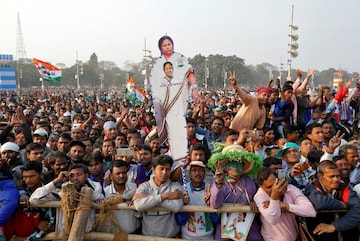
She orchestrated an extraordinary victory, securing 29 out of 42 seats, while the BJP managed only 12, and Congress barely held on to 1. This was a significant turnaround from the 2019 elections, where the BJP had secured 18 seats and the TMC 22.
Banerjee’s triumph can be attributed to her unparalleled understanding of the West Bengali electorate and her relentless grassroots activism. A true street fighter, she has spent decades connecting with the people, which has earned her their unwavering support. Despite the tumultuous times, her resilience and strategic prowess have not only fortified her position in the State but also reshaped the national political landscape.
In the aftermath of the 2024 elections, Mamata Banerjee’s TMC stands as a formidable force in the opposition bloc, ranking fourth in terms of the number of MPs, following the BJP, Congress, and Samajwadi Party.
This unprecedented victory has undoubtedly changed the political narrative in Bengal and elevated Mamata Banerjee's status on the national stage.
Bengali identity politics
As a grassroots leader, Mamata Banerjee astutely recognised that invoking Bengali pride would be crucial in her campaign. Observing the West Bengal Bharatiya Janata Party's (BJP) repeated strategy of deploying Prime Minister Narendra Modi and Home Minister Amit Shah for campaigns while distancing themselves locally, she seized the moment. Banerjee crafted a compelling narrative, portraying the BJP as a party from the Hindi heartland, alien to Bengal’s unique cultural ethos. She warned that their ascendancy would signify an intrusion by outsiders, leading to the sabotage of West Bengal’s rich heritage.
In the assembly elections, this strategy of emphasising Bengali pride and identity politics resonated deeply. Historically, Bengali identity politics was not prominent, given the Left's deep roots in Bengal's culture and ethos. However, Banerjee's narrative found massive support among the Bengali middle and upper classes. It is crucial to understand that while her welfare schemes had already secured a substantial support base, discontent lingered among the Hindu middle class due to ongoing corruption charges and other issues. By championing Bengali identity politics, Banerjee managed to win over this sceptical segment.
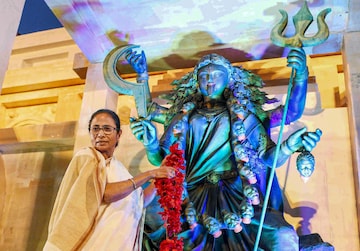
Mamata Banerjee's profound connection with the cultural and social fabric of Bengal enabled her to harness this potent sentiment effectively. She understood the pulse of the Bengali electorate, leveraging their inherent pride to galvanise support. This strategy not only consolidated her existing voter base but also expanded it, drawing in those disillusioned by corruption allegations and governance issues.
Banerjee’s deft political manoeuvring, grounded in a deep understanding of Bengali pride and identity, thus played a pivotal role in her remarkable electoral success. Her ability to transform cultural pride into a powerful political tool underscores her status as a masterful and intuitive leader, capable of turning the tide even in the face of formidable opposition.
Welfare And Women
In the 2024 Lok Sabha elections, Mamata Banerjee’s victory in West Bengal was a testament to the power of targeted welfare schemes. Her government’s initiatives, particularly those aimed at women, have been a game-changer in the political landscape.
The Kanyashree and Lakshmir Bhandar schemes stand out as pillars of Banerjee’s strategy. Kanyashree, aimed at preventing child marriage and promoting education among girls, has been a beacon of hope for young women. By providing financial incentives to continue education, the scheme has empowered a generation of women to dream bigger and aspire for independence.
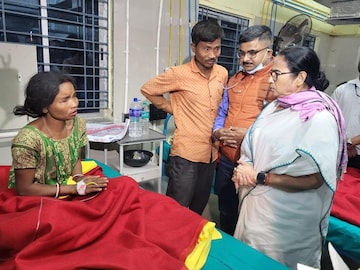
Lakshmir Bhandar, on the other hand, has provided financial support directly to the women of West Bengal, enhancing their agency and contributing to household stability. This scheme has been especially beneficial for women from marginalised communities, offering them a semblance of financial independence and security. The scheme provides Rs 1,000 per month to women in the general category and Rs 1,200 per month to women from SC/ST communities.
These schemes have not only addressed critical social issues but have also created a loyal voter base among women. The increased turnout of female voters in the 2024 elections was a clear indicator of their support. Banerjee’s focus on women’s welfare resonated with their aspirations, leading to a significant swing in her favour.
Moreover, these welfare initiatives have had a ripple effect on the state’s economy and social structure. By investing in women, Banerjee’s government has fostered a more inclusive growth model that promises to uplift entire communities.
Strategic Focus On Important Districts
Mamata Banerjee’s Trinamool Congress (TMC) secured a decisive victory in the 2024 Lok Sabha elections, performing remarkably in Jungle Mahal, North Bengal, and South Bengal.
In Jungle Mahal, the tribal belt of Bengal and a BJP stronghold since 2019, TMC’s resurgence was spectacular. Winning three out of five seats, the party showcased its regained trust among the people. This turnaround was driven by TMC’s nuanced grasp of the region’s identity politics. By engaging with diverse groups like the Santhal, Munda, Shabar, and Bhumij, and addressing conflicts between tribals and Kurmis, TMC dismantled the opposition’s vote bank.
In North Bengal, TMC’s emphasis on development and welfare resonated profoundly. The party’s dedication to addressing the issues of tea garden workers and enhancing infrastructure garnered significant support. This strategic focus enabled TMC to win the Coachbihar constituency, even against incumbent BJP leader and Junior Home Minister Nitish Pramanik.
In South Bengal, TMC’s traditional stronghold, the party maintained its dominance. The region’s diverse electorate, from urban intellectuals to rural masses, continued to back Banerjee’s governance, influenced by her development agenda and welfare initiatives.
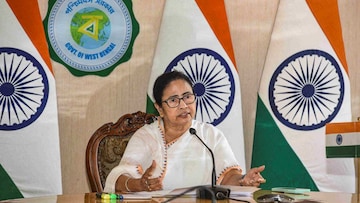
TMC’s victory is a testament to its strategic electoral campaign, focusing on grassroots issues and regional identities. The party’s ability to connect with the electorate on a personal level, addressing their concerns and aspirations, has been pivotal in its success.
The party's strong performance across critical regions of West Bengal was instrumental in its 2024 Lok Sabha election victory. Mamata Banerjee’s leadership, combined with the party’s strategic focus on development and identity politics, has solidified its dominance in the state’s political landscape.
Muslim Support
In the 2024 Lok Sabha elections, TMC's significant victory in West Bengal, heavily bolstered by the consolidated support of the Muslim community. The Citizenship Amendment Act (CAA) and Prime Minister Narendra Modi’s Hindutva push were pivotal factors in this political outcome.
The CAA, which the BJP expected to be beneficial, ironically backfired. The Act’s implementation created confusion among its intended beneficiaries and failed to resonate with the community’s expectations. This misstep resulted in a significant loss of trust among the Muslim electorate, a substantial portion of West Bengal’s population.
Concurrently, Modi’s Hindutva narrative, aimed at appealing to the majority, ended up alienating minority communities. The BJP’s campaign was perceived as divisive, sharply contrasting with Banerjee’s inclusive approach. Her outreach to Muslims, including financial assistance schemes and a balanced stance on religious matters, showcased a secular governance model that resonated with the community.
TMC capitalised on these developments, positioning itself as a protector of minority rights and secular values. Welfare schemes, such as Lakshmir Bhandar, further strengthened her appeal among women voters, including those from the Muslim community. This strategic alignment of welfare initiatives with inclusive politics ensured a robust support base for Banerjee, leading to her triumph in the elections.
National Political Image Elevation
Just a few months ago, Mamata Banerjee's Trinamool Congress (TMC) lost its national party status. When opposition parties formed the INDIA bloc, Banerjee was initially a significant part of it. However, tensions arose when Adhir Ranjan Chaudhary, a key figure in the Bengal Congress, made several unpleasant statements against her. Banerjee decided to go it alone, refusing to ally with either the Left or the Congress.
Now, with TMC securing 29 seats in the 2024 Lok Sabha elections, the political landscape has dramatically shifted. Despite past conflicts, the Congress high command has always considered Banerjee a vital part of the opposition bloc. Her recent triumph cements her position as an indispensable member of this alliance. On Wednesday, her nephew Abhishek Banerjee attended an opposition meeting in Delhi, signalling their intention to remain integral to the coalition.
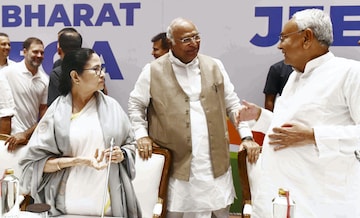
This development is crucial as the opposition alliance navigates the complex number game of parliamentary politics. Losing the support of 29 MPs would be a significant blow to the opposition, making Banerjee's inclusion essential. Within the opposition, after the Congress and the Samajwadi Party, TMC now holds the third-highest number of MPs. This victory not only elevates Banerjee's stature in national politics but also solidifies her influence within the opposition.
Mamata Banerjee's resurgence has far-reaching implications. Her ability to secure a substantial number of seats reinforces her role as a key player in national politics. It also demonstrates her resilience and strategic acumen, turning potential isolation into a position of strength. As the opposition prepares for future battles, Banerjee’s TMC stands as a formidable force, pivotal to any coalition's success. This victory in West Bengal has undeniably uplifted her stature on the national stage, ensuring her voice remains influential in shaping the country's political discourse.
—The author, Prof. Sayantan Ghosh (@sayantan_gh), is a political observer and columnist who teaches journalism at St. Xavier's College, Kolkata. The views expressed are personal.
Read his previous articles here
Allegations of corruption, including recruitment scams in schools and rising violence against women and minorities, marred the party's reputation. The Calcutta High Court mandated investigations by central agencies such as the CBI, Enforcement Directorate, and even the NIA. This led to the arrests and repeated questioning of several top TMC leaders, including Mamata’s nephew and general secretary, Abhishek Banerjee.
As the 2024 Lok Sabha elections approached, the BJP, led by Prime Minister Narendra Modi and Home Minister Amit Shah, launched an extensive campaign across West Bengal. Despite the daunting challenges and grim predictions from exit polls and political analysts, Mamata Banerjee once again showcased her unparalleled political acumen.

A supporter holds a cut-out of Mamata Banerjee, Chief Minister of the state of West Bengal, during "United India" rally attended by the leaders of India's main opposition parties ahead of the general election, in Kolkata, India, January 19, 2019. REUTERS/Rupak De Chowdhuri
She orchestrated an extraordinary victory, securing 29 out of 42 seats, while the BJP managed only 12, and Congress barely held on to 1. This was a significant turnaround from the 2019 elections, where the BJP had secured 18 seats and the TMC 22.
Banerjee’s triumph can be attributed to her unparalleled understanding of the West Bengali electorate and her relentless grassroots activism. A true street fighter, she has spent decades connecting with the people, which has earned her their unwavering support. Despite the tumultuous times, her resilience and strategic prowess have not only fortified her position in the State but also reshaped the national political landscape.
In the aftermath of the 2024 elections, Mamata Banerjee’s TMC stands as a formidable force in the opposition bloc, ranking fourth in terms of the number of MPs, following the BJP, Congress, and Samajwadi Party.
This unprecedented victory has undoubtedly changed the political narrative in Bengal and elevated Mamata Banerjee's status on the national stage.
Bengali identity politics
As a grassroots leader, Mamata Banerjee astutely recognised that invoking Bengali pride would be crucial in her campaign. Observing the West Bengal Bharatiya Janata Party's (BJP) repeated strategy of deploying Prime Minister Narendra Modi and Home Minister Amit Shah for campaigns while distancing themselves locally, she seized the moment. Banerjee crafted a compelling narrative, portraying the BJP as a party from the Hindi heartland, alien to Bengal’s unique cultural ethos. She warned that their ascendancy would signify an intrusion by outsiders, leading to the sabotage of West Bengal’s rich heritage.
In the assembly elections, this strategy of emphasising Bengali pride and identity politics resonated deeply. Historically, Bengali identity politics was not prominent, given the Left's deep roots in Bengal's culture and ethos. However, Banerjee's narrative found massive support among the Bengali middle and upper classes. It is crucial to understand that while her welfare schemes had already secured a substantial support base, discontent lingered among the Hindu middle class due to ongoing corruption charges and other issues. By championing Bengali identity politics, Banerjee managed to win over this sceptical segment.

West Bengal Chief Minister Mamata Banerjee inaugurating a Kali Puja pandal at Siliguri in North Bengal, Thursday, Oct. 24, 2019. (PTI Photo)
Mamata Banerjee's profound connection with the cultural and social fabric of Bengal enabled her to harness this potent sentiment effectively. She understood the pulse of the Bengali electorate, leveraging their inherent pride to galvanise support. This strategy not only consolidated her existing voter base but also expanded it, drawing in those disillusioned by corruption allegations and governance issues.
Banerjee’s deft political manoeuvring, grounded in a deep understanding of Bengali pride and identity, thus played a pivotal role in her remarkable electoral success. Her ability to transform cultural pride into a powerful political tool underscores her status as a masterful and intuitive leader, capable of turning the tide even in the face of formidable opposition.
Welfare And Women
In the 2024 Lok Sabha elections, Mamata Banerjee’s victory in West Bengal was a testament to the power of targeted welfare schemes. Her government’s initiatives, particularly those aimed at women, have been a game-changer in the political landscape.
The Kanyashree and Lakshmir Bhandar schemes stand out as pillars of Banerjee’s strategy. Kanyashree, aimed at preventing child marriage and promoting education among girls, has been a beacon of hope for young women. By providing financial incentives to continue education, the scheme has empowered a generation of women to dream bigger and aspire for independence.

West Bengal Chief Minister and TMC supremo Mamata Banerjee visits people injured in a storm, at a hospital in Jalpaiguri district, Sunday night, March 31, 2024. (PTI Photo)
Lakshmir Bhandar, on the other hand, has provided financial support directly to the women of West Bengal, enhancing their agency and contributing to household stability. This scheme has been especially beneficial for women from marginalised communities, offering them a semblance of financial independence and security. The scheme provides Rs 1,000 per month to women in the general category and Rs 1,200 per month to women from SC/ST communities.
These schemes have not only addressed critical social issues but have also created a loyal voter base among women. The increased turnout of female voters in the 2024 elections was a clear indicator of their support. Banerjee’s focus on women’s welfare resonated with their aspirations, leading to a significant swing in her favour.
Moreover, these welfare initiatives have had a ripple effect on the state’s economy and social structure. By investing in women, Banerjee’s government has fostered a more inclusive growth model that promises to uplift entire communities.
The success of welfare schemes in West Bengal under Mamata Banerjee’s leadership has been a crucial factor in her electoral victory. By empowering women, she has not only won their votes but has also set a precedent for inclusive governance that other states are likely to follow.
Strategic Focus On Important Districts
Mamata Banerjee’s Trinamool Congress (TMC) secured a decisive victory in the 2024 Lok Sabha elections, performing remarkably in Jungle Mahal, North Bengal, and South Bengal.
In Jungle Mahal, the tribal belt of Bengal and a BJP stronghold since 2019, TMC’s resurgence was spectacular. Winning three out of five seats, the party showcased its regained trust among the people. This turnaround was driven by TMC’s nuanced grasp of the region’s identity politics. By engaging with diverse groups like the Santhal, Munda, Shabar, and Bhumij, and addressing conflicts between tribals and Kurmis, TMC dismantled the opposition’s vote bank.
In North Bengal, TMC’s emphasis on development and welfare resonated profoundly. The party’s dedication to addressing the issues of tea garden workers and enhancing infrastructure garnered significant support. This strategic focus enabled TMC to win the Coachbihar constituency, even against incumbent BJP leader and Junior Home Minister Nitish Pramanik.
In South Bengal, TMC’s traditional stronghold, the party maintained its dominance. The region’s diverse electorate, from urban intellectuals to rural masses, continued to back Banerjee’s governance, influenced by her development agenda and welfare initiatives.

West Bengal Chief Minister Mamata Banerjee addresses the media regarding adenovirus infections, in Kolkata, Thursday, March 2, 2023. (PTI Photo)
TMC’s victory is a testament to its strategic electoral campaign, focusing on grassroots issues and regional identities. The party’s ability to connect with the electorate on a personal level, addressing their concerns and aspirations, has been pivotal in its success.
The party's strong performance across critical regions of West Bengal was instrumental in its 2024 Lok Sabha election victory. Mamata Banerjee’s leadership, combined with the party’s strategic focus on development and identity politics, has solidified its dominance in the state’s political landscape.
Muslim Support
In the 2024 Lok Sabha elections, TMC's significant victory in West Bengal, heavily bolstered by the consolidated support of the Muslim community. The Citizenship Amendment Act (CAA) and Prime Minister Narendra Modi’s Hindutva push were pivotal factors in this political outcome.
The CAA, which the BJP expected to be beneficial, ironically backfired. The Act’s implementation created confusion among its intended beneficiaries and failed to resonate with the community’s expectations. This misstep resulted in a significant loss of trust among the Muslim electorate, a substantial portion of West Bengal’s population.
Concurrently, Modi’s Hindutva narrative, aimed at appealing to the majority, ended up alienating minority communities. The BJP’s campaign was perceived as divisive, sharply contrasting with Banerjee’s inclusive approach. Her outreach to Muslims, including financial assistance schemes and a balanced stance on religious matters, showcased a secular governance model that resonated with the community.
TMC capitalised on these developments, positioning itself as a protector of minority rights and secular values. Welfare schemes, such as Lakshmir Bhandar, further strengthened her appeal among women voters, including those from the Muslim community. This strategic alignment of welfare initiatives with inclusive politics ensured a robust support base for Banerjee, leading to her triumph in the elections.
National Political Image Elevation
Just a few months ago, Mamata Banerjee's Trinamool Congress (TMC) lost its national party status. When opposition parties formed the INDIA bloc, Banerjee was initially a significant part of it. However, tensions arose when Adhir Ranjan Chaudhary, a key figure in the Bengal Congress, made several unpleasant statements against her. Banerjee decided to go it alone, refusing to ally with either the Left or the Congress.
Now, with TMC securing 29 seats in the 2024 Lok Sabha elections, the political landscape has dramatically shifted. Despite past conflicts, the Congress high command has always considered Banerjee a vital part of the opposition bloc. Her recent triumph cements her position as an indispensable member of this alliance. On Wednesday, her nephew Abhishek Banerjee attended an opposition meeting in Delhi, signalling their intention to remain integral to the coalition.

Congress President Mallikarjun Kharge, party leader Rahul Gandhi, West Bengal CM and TMC supremo Mamata Banerjee and Bihar CM Nitish Kumar during the INDIA alliance meeting, at a hotel in Mumbai, Thursday, Aug. 31, 2023. (PTI Photo)
This development is crucial as the opposition alliance navigates the complex number game of parliamentary politics. Losing the support of 29 MPs would be a significant blow to the opposition, making Banerjee's inclusion essential. Within the opposition, after the Congress and the Samajwadi Party, TMC now holds the third-highest number of MPs. This victory not only elevates Banerjee's stature in national politics but also solidifies her influence within the opposition.
Mamata Banerjee's resurgence has far-reaching implications. Her ability to secure a substantial number of seats reinforces her role as a key player in national politics. It also demonstrates her resilience and strategic acumen, turning potential isolation into a position of strength. As the opposition prepares for future battles, Banerjee’s TMC stands as a formidable force, pivotal to any coalition's success. This victory in West Bengal has undeniably uplifted her stature on the national stage, ensuring her voice remains influential in shaping the country's political discourse.
—The author, Prof. Sayantan Ghosh (@sayantan_gh), is a political observer and columnist who teaches journalism at St. Xavier's College, Kolkata. The views expressed are personal.
Read his previous articles here
Check out our in-depth Market Coverage, Business News & get real-time Stock Market Updates on CNBC-TV18. Also, Watch our channels CNBC-TV18, CNBC Awaaz and CNBC Bajar Live on-the-go!
